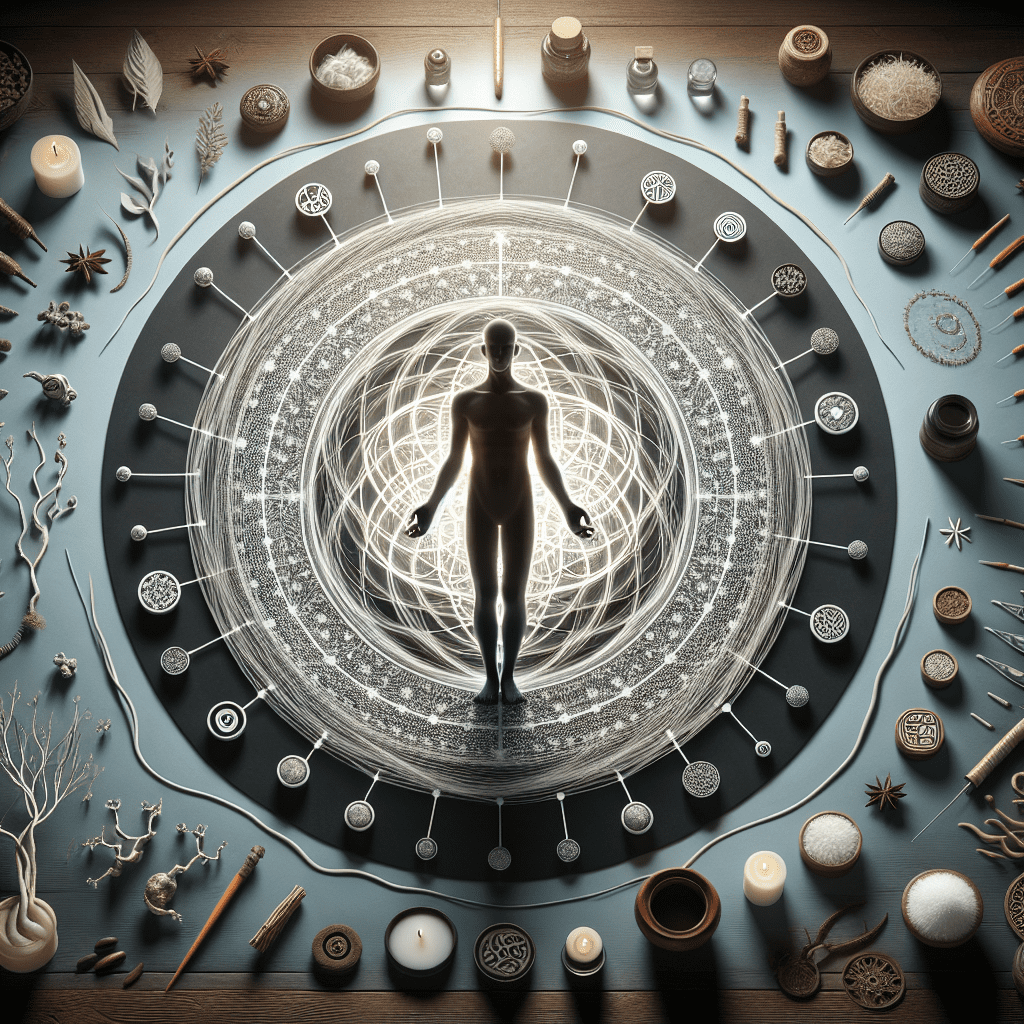In the quiet corners of a modern clinic, an AI system analyzes your pulse patterns, tongue appearance, and constitutional type—all hallmarks of traditional Eastern diagnostic methods that date back thousands of years. Yet there’s nothing ancient about the technology making these assessments. Welcome to 2025, where Eastern Medicine AI represents one of healthcare’s most fascinating convergences: the marriage of time-honored healing wisdom with cutting-edge artificial intelligence.
This isn’t simply a case of old meets new—it’s a revolutionary rebirth that promises to transform how we understand and practice wellness. As traditional Eastern healing practices gain recognition worldwide, their integration with AI technologies is creating a healthcare approach that honors ancestral wisdom while embracing the precision and accessibility that modern technology provides.
The Timeless Wisdom of Eastern Medicine
Eastern medicine, with roots stretching back more than two millennia, approaches health through a fundamentally different lens than its Western counterpart. Rather than focusing solely on symptom management, Eastern healing traditions view the body as an interconnected system where physical, emotional, and spiritual elements must remain in balance.
At the heart of Eastern medicine lies the concept of “qi” (or “chi”)—the vital life energy that flows through pathways called meridians. When this energy becomes blocked or imbalanced, illness manifests. Traditional practitioners restore harmony through various techniques:
Acupuncture places fine needles at specific points along these meridians to redirect energy flow. Herbal remedies, often complex formulations tailored to individual constitutions, support the body’s natural healing processes. Practices like tai chi and qigong combine movement with breathwork to regulate qi throughout the body.
“Eastern medicine has always been personalized,” explains Dr. Lin Wei, a fifth-generation herbalist and consultant for Eastern Medicine AI systems. “Long before ‘personalized medicine’ became a Western buzzword, Eastern practitioners were creating individualized treatment plans based on a person’s unique constitution and specific imbalances.”
This holistic approach extends to nutrition as well. Eastern medicine doesn’t separate food from medicine—they’re seen as part of the same continuum, with dietary recommendations changing seasonally and according to one’s constitutional type. The Five Element Theory, which classifies foods and body types according to wood, fire, earth, metal, and water elements, guides these personalized nutritional approaches.
AI’s Transformative Impact on Eastern Medicine
While Eastern medicine’s holistic principles have remained relatively constant, the tools for delivering and validating these approaches are undergoing a profound transformation through artificial intelligence. By 2025, Eastern Medicine AI systems are revolutionizing several key areas:
Enhanced Diagnostics Through Pattern Recognition
Traditional Eastern diagnosis relies heavily on observational skills—assessing the pulse, examining the tongue, noting complexion changes, and other subtle indicators. AI systems are now being trained on millions of these diagnostic patterns, achieving remarkable accuracy in identifying constitutional types and imbalances.
“What might take a human practitioner decades to master can now be augmented by AI systems that have ‘seen’ more cases than any single doctor could in a lifetime,” notes Dr. Sophia Chen, who leads the integration of AI technologies at the International Conference on Eastern Medicine and AI, which has been running annually since 2021.
In Beijing, at the 2025 China Medical Development Conference, researchers demonstrated an AI system that could identify pulse patterns with 93% accuracy compared to assessments by master practitioners with 40+ years of experience.
Herbal Formula Optimization
Eastern herbal remedies often contain dozens of ingredients working in complex synergy. AI systems are now mapping these interactions at a molecular level, identifying how traditional formulations affect biological pathways and suggesting refinements based on a patient’s genetic profile.
A groundbreaking study utilizing the BATMAN-TCM2 database combined with Precious3GPT, a multi-omics transformer model, has revolutionized how researchers understand herb-target interactions. This AI-driven framework can predict previously unknown medicinal properties of traditional herbs and suggest novel combinations that traditional practitioners might never have considered.
Personalized Treatment Algorithms
Perhaps most exciting is how Eastern Medicine AI systems are creating truly personalized wellness plans that adapt in real-time. These systems consider not just physical symptoms but environmental factors, seasonal changes, emotional states, and lifestyle patterns—all critical components in Eastern medical theory.
“The AI doesn’t replace the practitioner’s wisdom; it amplifies it,” explains Zhang Wei, developer of EASTCHI, an AI system specializing in Eastern constitutional analysis. “By processing thousands of variables simultaneously, the technology can suggest refinements to treatment plans that honor traditional principles while accounting for individual variations.”
Benefits of the Eastern Medicine AI Revolution
As Eastern medicine merges with artificial intelligence, several key benefits are emerging that make this fusion particularly powerful:
Scientific Validation and Increased Credibility
For decades, Eastern medicine faced skepticism from the Western medical establishment, partly due to challenges in standardizing and quantifying its approaches. AI is helping bridge this gap by providing empirical evidence for traditional practices.
Research institutions are now using AI to map the effects of acupuncture on neural pathways, validate herbal interactions at the molecular level, and document outcomes across large patient populations. This scientific validation is helping Eastern medicine gain acceptance in conventional healthcare settings.
“We’re seeing a transformation in how Eastern medicine is perceived,” says Dr. Maya Patel, who researches AI applications in traditional medicine. “When we can show clear patterns of efficacy through data analysis, even skeptics begin to take notice.”
Global Accessibility and Knowledge Preservation
Traditional Eastern medicine has historically relied on direct transmission from master to student, limiting its reach. AI systems are democratizing access to this knowledge while helping preserve traditional wisdom that might otherwise be lost.
Digital platforms now offer personalized Eastern medicine consultations to people in regions where trained practitioners are scarce. By 2025, these systems have become sophisticated enough to recognize subtle constitutional differences across diverse populations, adapting recommendations accordingly.
“What’s remarkable about these AI systems is how they’re preserving knowledge that might otherwise fade away,” notes cultural anthropologist Dr. James Kim. “We’re seeing rare herbal formulations and diagnostic techniques from remote villages being documented, analyzed, and made available globally.”
Integration with Conventional Healthcare
The AI revolution is facilitating unprecedented integration between Eastern and Western approaches. Rather than competing paradigms, healthcare systems are increasingly embracing complementary models that leverage the strengths of both traditions.
In forward-thinking clinics, AI systems now recommend Eastern approaches for certain conditions while suggesting conventional treatments for others, creating truly integrative care plans backed by data on outcomes. This integration aligns perfectly with HerbalsZen’s philosophy of merging ancient wisdom with modern technology to create comprehensive wellness solutions.
The Path Forward: Eastern Medicine AI in 2025 and Beyond
As we look to the future of Eastern Medicine AI, several important developments are shaping how this field will evolve:
Collaborative Development Models
The most successful Eastern Medicine AI systems of 2025 share a common feature: they’ve been developed through genuine collaboration between AI specialists and traditional practitioners. This ensures that technological innovations remain faithful to Eastern medicine’s philosophical foundations.
“The key is respecting both knowledge systems equally,” explains Dr. Li Chen, who leads collaborative AI development at a major research institute. “When we bring together master herbalists with data scientists in true partnership, the resulting technology honors the depth of traditional wisdom while leveraging computational power.”
This collaborative approach mirrors HerbalsZen’s development philosophy for their EASTCHI AI system, which integrates insights from practitioners with multi-generational lineages alongside cutting-edge machine learning expertise.
Ethical Considerations and Cultural Sensitivity
As Eastern medicine becomes increasingly digitized, important questions about cultural heritage, intellectual property, and appropriate use are being addressed. Leading organizations in the field have established ethical frameworks that acknowledge the cultural origins of Eastern healing traditions while making them accessible to broader populations.
“There’s a delicate balance between preservation and evolution,” notes bioethicist Dr. Amara Singh. “The best AI systems honor the cultural contexts these healing practices emerged from while allowing them to grow and adapt to contemporary needs.”
Preventive Health Revolution
Perhaps the most profound impact of Eastern Medicine AI lies in its emphasis on prevention. Eastern healing traditions have always prioritized maintaining wellness rather than just treating disease—a philosophy that AI systems are now amplifying through predictive analytics.
By 2025, these systems can identify subtle imbalances months or years before they manifest as clinical symptoms, suggesting targeted interventions based on Eastern principles. This preventive approach aligns perfectly with growing consumer interest in proactive health management.
“What we’re seeing is a shift from reactive to predictive healthcare,” says health futurist Maya Johnson. “Eastern medicine has always excelled at detecting imbalances early, and now AI is making that approach scalable and precise in ways we couldn’t have imagined a decade ago.”
A Renaissance of Healing Wisdom
As we witness the digital rebirth of Eastern medicine through AI integration, we’re not simply seeing technological advancement—we’re experiencing a renaissance of healing wisdom that combines the best of ancient knowledge with modern capabilities.
This convergence honors the holistic principles at the heart of Eastern medicine—understanding that true wellness encompasses physical, emotional, and spiritual dimensions—while leveraging technology to make these approaches more accessible, personalized, and effective than ever before.
For health-conscious individuals seeking natural, holistic approaches to wellness, the Eastern Medicine AI revolution offers unprecedented opportunities to access personalized guidance rooted in thousands of years of healing wisdom. As HerbalsZen’s EASTCHI AI demonstrates, when ancient wisdom and modern technology unite with respect and understanding, the possibilities for enhancing human wellbeing expand exponentially.
In this digital rebirth, Eastern medicine isn’t being replaced or diminished—it’s being amplified and revitalized, reaching more people with greater precision while remaining true to its foundational philosophy: that balance, harmony, and the body’s innate wisdom are the true sources of lasting health.




